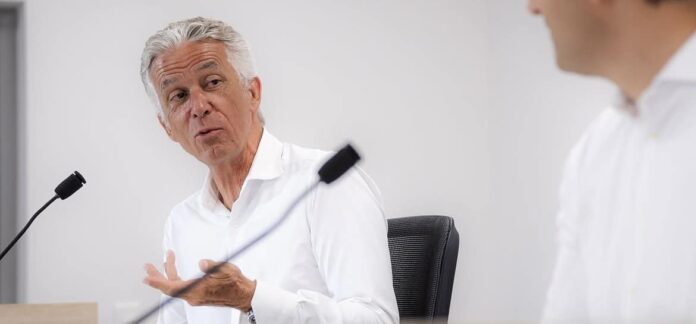The former president of OGC Nice, Jean-Pierre Rivère, will be part of Éric Ciotti’s ticket for the municipal elections of 2026 in Nice. The deputy and president of the UDR announced this Monday, October 6, that the businessman would be his first deputy in case of victory. A decision that is already causing strong reactions, especially from the Estrosi camp.
It was in a lounge at the Boscolo Hotel in Nice that Éric Ciotti spoke this Monday morning. Before the press, the deputy and president of the Union of the Republican Right (UDR) confirmed what rumors had been suggesting for several days. Jean-Pierre Rivère, former president of OGC Nice, joins his team for the municipal elections of March 2026. “He joins us in this adventure”, Éric Ciotti declared at the start of the conference. The politician, a mayoral candidate in Nice, added that Jean-Pierre Rivère would be his first deputy if he won the election.
This announcement ends weeks of speculation. Since summer, Jean-Pierre Rivère’s name had been circulating in local discussions. The former manager of the Nice club, 68 years old, left the presidency of OGC Nice on August 20, at the end of his term. After fourteen seasons at the helm of the club, he had expressed a desire to “turn a page” while remaining involved through the club’s Endowment Fund.
His political career change thus takes a concrete turn. A figure in the economic and sporting world of the Côte d’Azur, Jean-Pierre Rivère embarks on a new public role. His commitment alongside Éric Ciotti signals a closer relationship between the business, sports, and local political worlds.
Immediate reactions and revived tensions
The announcement quickly sparked reactions, notably from Christian Estrosi’s camp, the outgoing mayor and also a candidate for re-election. The mayor’s entourage reacted strongly to Rivère’s presence on Éric Ciotti’s ticket:
“Jean-Pierre Rivère has always been a businessman looking to make money. He even sought to buy the stadium at a low price, which the mayor has always refused. He also wanted to replace the ‘I love Nice’ with a piece of art by his partner, which was inconceivable. That explains a lot.”
This jab illustrates the intensity of the relations between the two camps. The 2026 municipal elections are already shaping up to be a direct confrontation between two local figures: Christian Estrosi, seeking a new mandate, and Éric Ciotti, determined to win the town hall.
For the former president of OGC Nice, this political entry marks more of a continuity than a break. During his presidency, Jean-Pierre Rivère often spoke about the links between sports and the territory. He defended the idea of a club rooted in its city, open to society, and involved in local projects. His new role could extend this approach to another level.
Observers note, though, a clear strategy on Éric Ciotti’s side: associating his image with that of a leader recognized for his management and understanding of the local network. In the political context of Nice, this association between a right-wing elected official and a business figure aims to appeal to an electorate concerned with stability and pragmatism.
A career anchored in the local territory
Jean-Pierre Rivère built his reputation in real estate before turning to football. Founder of ISelection, a company specializing in the digitalization of new real estate, he sold his company to Nexity in 2008. He then created Rivère Group, a structure active in high-end real estate on the Côte d’Azur. This trajectory earned him recognition as a major player in the local economic fabric.
His arrival at the head of OGC Nice, in 2011, marked a new stage. At that time, the club was going through a difficult period both sportingly and financially. Rivère focused on stabilizing the team, modernizing its infrastructure, and attracting new investors. Under his presidency, the Gym made a lasting presence at the top of Ligue 1 and participated in several European campaigns.
Despite his cautious style, he established himself as an indispensable figure in French football. Neither flamboyant nor omnipresent in the media, he favored method and consultation. During crises, several club presidents tended to call on him to defuse tensions.
In July last year, during his farewell speech, he admitted: “I am leaving because the club is now structured, solid, ambitious, and the path is clear.” Words that now resonate as a transition to another form of engagement.
A campaign under high tension
Éric Ciotti’s announcement reshuffles a campaign already fraught with tension. With Jean-Pierre Rivère by his side, the deputy hopes to broaden his appeal beyond traditional right-wing voters in Nice. The former Gym boss brings notoriety and the image of an experienced manager.
It remains to be seen how this alliance will be perceived by the people of Nice. Christian Estrosi’s supporters denounce an alliance of economic interests rather than political convictions. On the other hand, Éric Ciotti’s camp emphasizes competence and knowledge of the territory.
For Jean-Pierre Rivère, a new page is turning. After fourteen years leading an emblematic club, he is about to take on a different type of match, on an equally demanding field: the politics of Nice.


